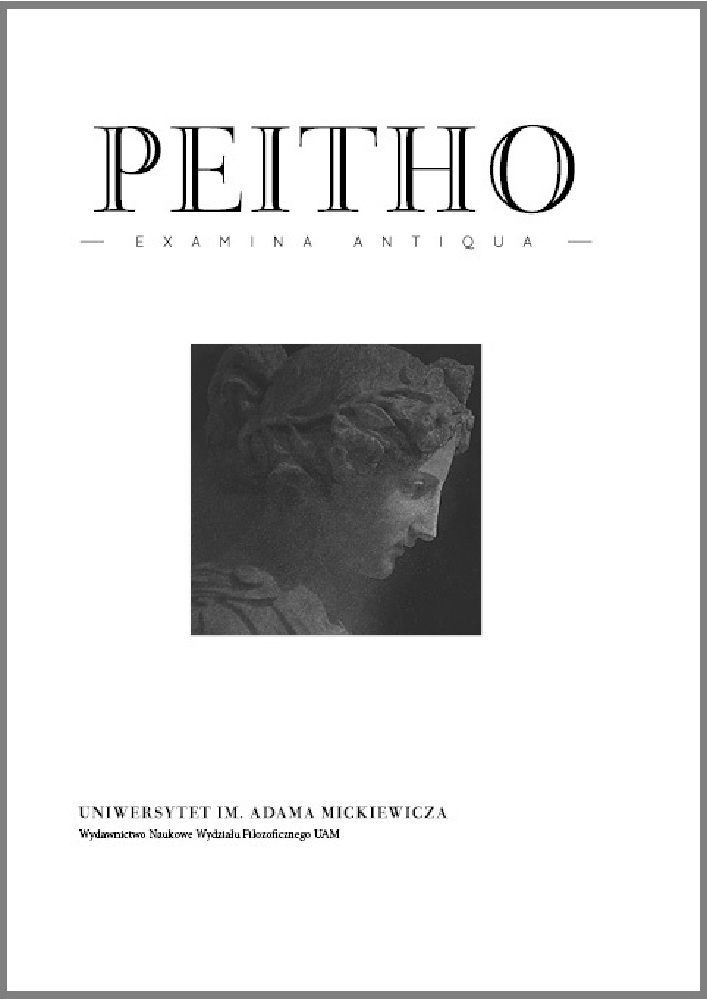Abstract
The present paper focuses on the two works of Plato’s first tetralogy
so as to bring out and generally characterize the Socratic dimension
of Plato’s philosophizing. It is common knowledge that Socrates’ trial
and defense inspired Plato to engage in dialogical writing which culminated
in the famous logoi Sokratikoi. The article deals with the following
issues: 1. Philosophy as a ‘care for the soul’ in the Apology; 2. “The unexamined
life is not worth living for a human being” (Ap. 38a); 3. Philosophy
as a service to the god in the Euthyphro; 4. Socrates’ elenchos;
5. Plato’s logoi Sokratikoi. While the issues are lively debated in the
subject literature, the present paper makes references to several important
studies and to the broader account of Plato’s philosophy that is to be
found in Erler 2006 and Erler 2007.
References
Albert, K., 1998, Griechische Religion und Platonische Philosophie, Dettelbach.
Apelt, O., 1912, „Die Taktik des Platonischen Sokrates“, in: Apelt, O., Platonische Aufsätze, Leipzig–Berlin, pp. 96–108.
Benson, H. H., 2000, Socratic Wisdom: the Model of Knowledge in Plato’s Early Dialogues, New York.
Clay, D., “The origins of the Socratic dialogues”, in: Vander Waerdt, P. A. (ed.): The Socratic Movement, Ithaca, pp. 23–47.
Dorion, L.‑A., 2004, Socrate, Paris.
Döring, K., 1987, „Der Sokrates der Platonischen Apologie“, WJA 13, pp. 75–94.
Erler, M., 1987, Der Sinn der Aporien in den Dialogen Platons, Berlin–New York.
Erler, M., 2002 „Hilfe der Götter und Erkenntnis des Selbst: Sokrates als Göttergeschenk bei Platon und den Platonikern“, in: Kobusch, Th., Erler, M. (hrsg.), Metaphysik und Religion, München, pp. 387–414.
Erler, M., 2006 Plato, München (przekład polski w opracowaniu).
Erler, M., 2007, Platon, in: Flashar, K. (Hrsg.), Grundriss der Geschichte der Philosophie. Die Philosophie der Antike, Band 2/1, Basel.
Frede, D., 1997, Kommentar, in: Platon, Philebos. Übersetzung und Kommentar (Platon Werke III 2), Göttingen.
Gaiser, K., 1984, Platone come scrittore filosofico, Napoli.
Gaiser, K., 1988, Philodems Academica (Supplementum Platonicum I), Stuttgart–Bad Cannstatt.
Görgemanns, H., 1994, Platon, Heidelberg.
Giannantoni, G., 1991, Socratis et Socraticorum Reliquiae, vol. I–IV, Napoli.
Heitsch, E., 2004, Kommentar, in: Platon, Apologie des Sokrates. Übersetzung und Kommentar (Platon Werke I 2), Göttingen.
Kahn, Ch., 1996, Plato and the Socratic dialogue, Cambridge.
Kapp, E., 1965, Der Ursprung der Logik bei den Griechen. Göttingen.
Nietzsche, F., 1913, Einleitung in das Studium der platonischen Dialoge, in: idem, Werke III, Abtlg., Bd. XIX (Philologica), Leipzig.
Press, G. A., (ed.), 2000, Who Speaks for Plato? Studies in Platonic Anonymity, Lanham.
Schleiermacher, F., 1804, ‘Einleitung’, in Platon, Sämtliche Werke in der Übersetzung, Bd. 1, Berlin, pp. 5–36 (przedruk w: Gaiser, K., (hrsg.), 1969, Das Platonbild, Hildesheim, pp. 1–32).
Stemmer, P., 1992, Platons Dialektik. Die frühen und mittleren Dialoge, Berlin.
Vlastos, G., 1973, The individual as object of love, w: Vlastos G., Platonic studies, Princeton, pp. 1–34 (przekład polski: Indywiduum jako przedmiot milosci, tłum. P. Paliwoda, Warszawa 1994).
Vlastos, G., 1991, Socrates: Ironist and Moral Philosopher, Cambridge.
Vlastos, G., 1992, „Socratic irony”, in: Benson, H. H. (ed.): Essays on the Philosophy of Socrates, New York.
License
Peitho provides immediate open access to its content on the principle that making research freely available to the public supports a greater global exchange of knowledge.
